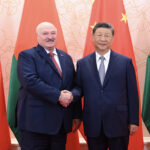A symposium was held in Beijing on August 5 to commemorate the 100th anniversary of the birth of Comrade Ren Jianxin. Wang Huning, a member of the Standing Committee of the Political Bureau of the CPC Central Committee and chairman of the National Committee of the Chinese People’s Political Consultative Conference, attended the symposium and met with Comrade Ren Jianxin’s relatives before the event.
Comrade Ren Jianxin was an outstanding leader in China’s political and legal affairs, serving as a member of the Secretariat of the 14th CPC Central Committee, former secretary of the Central Political and Legal Affairs Commission, vice chairman of the 9th National Committee of the CPPCC, and former president of the Supreme People’s Court.
Chen Wenqing, a member of the Political Bureau of the CPC Central Committee and secretary of the Central Political and Legal Affairs Commission, recalled Comrade Ren Jianxin’s remarkable life at the symposium. He emphasized the need to learn from Ren’s unwavering loyalty to the Party, lifelong dedication to political and legal work, profound commitment to justice for the people, strict self-discipline, integrity, and determined spirit to strive tirelessly for the modernization of China and the great cause of national rejuvenation.
Zhang Jun, president of the Supreme People’s Court, attended the symposium. Wang Dongfeng, vice chairman and secretary-general of the National Committee of the CPPCC, presided over the event.
Beijing
Beijing, the capital of China, is a historic city with over 3,000 years of history, serving as the political and cultural heart of the country for much of the past millennium. It is home to iconic landmarks like the Forbidden City, a UNESCO World Heritage Site and the imperial palace of the Ming and Qing dynasties, as well as the Great Wall of China nearby. Today, Beijing blends ancient traditions with modernity, hosting global events like the 2008 Olympics while preserving its rich cultural heritage.
CPC Central Committee
The **CPC Central Committee** is the core leadership body of the Communist Party of China (CPC), responsible for implementing major decisions and policies. Established in 1921 alongside the founding of the CPC, it guides the party’s direction between national congresses, shaping China’s political and economic development. Its headquarters, located in Beijing, symbolizes the party’s central authority in governing the country.
Chinese People’s Political Consultative Conference
The Chinese People’s Political Consultative Conference (CPPCC) is a key political advisory body in China, established in 1949 to unite various political parties, organizations, and representatives in advising the government on policy and social issues. It operates under the leadership of the Communist Party of China (CPC) and plays a role in China’s multi-party cooperation system. Historically, it helped consolidate support for the new government after the founding of the People’s Republic of China and continues to promote political consultation and democratic supervision.
Central Political and Legal Affairs Commission
The Central Political and Legal Affairs Commission (CPLC) is a key Communist Party body overseeing China’s legal and political security system. Established to ensure Party control over law enforcement, judiciary, and public security, it coordinates policies on governance, stability, and anti-corruption. Historically, it has played a central role in shaping China’s legal framework and maintaining political security under Party leadership.
Supreme People’s Court
The Supreme People’s Court is the highest judicial organ in China, established in 1954 under the Constitution of the People’s Republic of China. It oversees the administration of justice nationwide, interprets laws, and reviews major legal cases. As the apex of China’s judicial system, it plays a key role in upholding socialist rule of law under the leadership of the Communist Party of China.
National Committee of the CPPCC
The National Committee of the Chinese People’s Political Consultative Conference (CPPCC) is a key political advisory body in China, established in 1949 to unite various political parties, organizations, and representatives in advising the government on policy and social issues. It reflects the Communist Party of China’s united front strategy, promoting multi-party cooperation and political consultation under its leadership. The CPPCC plays a symbolic role in China’s political system, though its decisions are non-binding.

